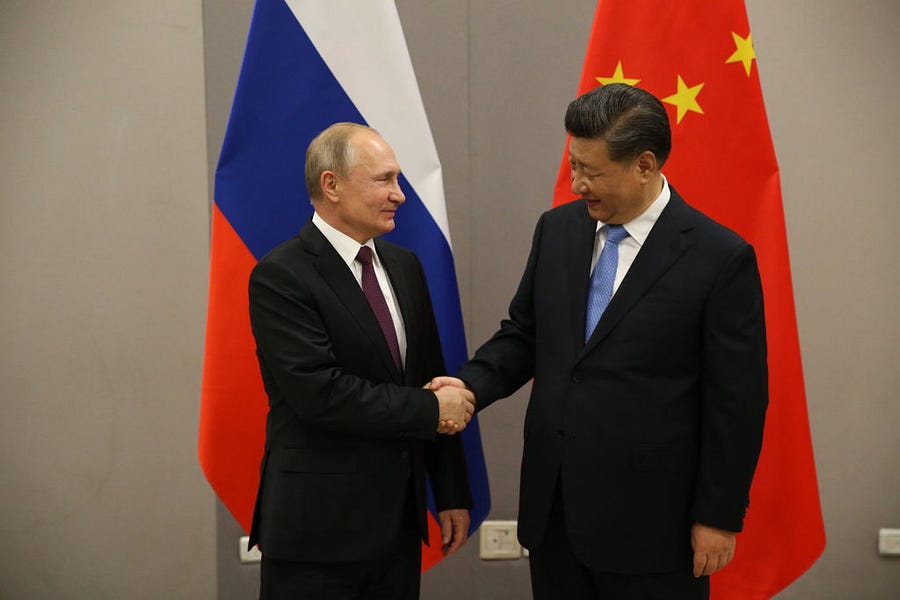When Vladimir Putin and Xi Jinping met on the same day Beijing National Stadium hosted the Olympics’ opening ceremony, it wasn’t to brainstorm ideas for “promoting a peaceful society concerned with the preservation of human dignity,” as the Olympic Charter states. At the time, Putin was topping off his blood supplies for field hospitals the Russian army had raised in its final preparations for its assault on Ukraine. And Xi’s “army of western social media influencers” had kicked off its propaganda campaign to whitewash his regime’s massive human rights abuses.
Putin came away from that meeting with nearly $120 billion in new economic agreements, and Xi announced Putin as China’s junior partner in Beijing’s ongoing political, economic, and military campaign to reshape the global order. The Joint Statement of the Russian Federation and the People’s Republic of China on the International Relations Entering a New Era and the Global Sustainable Development the two autocrats released after their meeting shows that China, under Xi, views Russian authoritarianism itself as a strategic asset and embodies the goal of Xi’s decade-long outreach to Moscow.
On March 22, 2013, Xi arrived in Moscow to meet Vladimir Putin. It was Xi’s first foreign trip as China’s leader. “Xi’s choice of destination,” Reuters observed, “sent a signal to the United States that the world’s largest energy producer, Russia, and its biggest consumer, China, want to bolster their joint clout as a financial and geopolitical counterweight to Washington.
Xi has been a good partner for Putin over the years. Beijing has provided diplomatic cover for Russian aggression, strengthened military ties, increased bilateral trade, and deepened technological and scientific engagement.
When Putin carved Crimea from Ukraine in 2014, Beijing abstained from a U.N. Security Council vote condemning the action. “China has always upheld the principles of diplomacy and the fundamental norms of international relations,” China’s foreign ministry spokesman said then. “At the same time, we also take into consideration the history and the current complexities of the Ukraine issue.”
Fast forward to Putin’s latest war—a war Putin has justified on historical and national security grounds. “The sovereignty and territorial integrity of all countries should be respected and maintained,” Chinese Foreign Ministry spokesperson Wang Wenbin stated on February 25. “At the same time,” he added, “we also see that the Ukrainian issue has its complex history, and we understand Russia’s legitimate concerns on security issues.” During the Security Council debate, as U.S. Ambassador to the U.N. Linda Thomas-Greenfield unsuccessfully sought China’s help in isolating Russia, Beijing’s ambassador, Zhang Jun, responded: “Our message is consistent and clear: Resolve any differences through diplomacy. Stop hyping up the tension. Russia’s legitimate security concerns should be seriously addressed.”
China remains Russia’s largest trading partner. Since Russia seized Crimea, bilateral trade between the two has doubled to about $140 billion annually. That’s a small amount of China’s vast global economic reach, but China’s gains from this economic engagement go beyond getting a good deal on Russian oil and gas. Huawei, for example, has joint labs at 11 Russian research centers, the latest a collaboration with the Moscow Institute of Physics and Technology on “research and development in the field of artificial intelligence and deep learning.” In November, the U.S. Department of Commerce added the institute to its military end-user (MEU) blacklist “on the basis of its production of military end-use products for a military end-user.” Twelve Chinese entities, among others, were also flagged.
A May 2021 unclassified report, Countering Emerging Chinese and Russian Hypersonic Threats, prepared for the Pentagon’s Defense Threat Reduction Agency, noted:
Future Sino-Russian collaboration on hypersonic weapons is plausible given their extensive military and diplomatic cooperation in other security areas. For more than a decade, Russia and China have engaged in an extensive exercise program, both bilaterally and in a multilateral format. In the last few years, Moscow and Beijing have undertaken several bilateral counter-BMD exercises. They might extend these to cover hypersonic systems. Furthermore, Russian and Chinese representatives have coordinated their arms control stances on several issues…. Russia has sold the PLA substantial advanced military equipment during the past three decades, which has enhanced China’s power projection and A2/AD capabilities in multiple dimensions, eroding U.S. military advantages. In October 2019, Putin surprisingly announced that Russia was helping the PRC develop a strategic missile early-warning system, one of its most sensitive military technologies. Over the next decade, the same considerations might lead to future Sino-Russian cooperation in researching, developing, or exchanging hypersonic technologies related to propulsion, sensors, or countermeasures. Since their hypersonic capabilities are different, Russia and China have an incentive to pool their efforts.
In his lengthy 2017 essay, The Authoritarian Challenge: China, Russia and the Threat to the Liberal International Order, Princeton’s Aaron Friedberg wrote that “closer cooperation between Russia and China is more likely than a new Sino-Russian split” largely because “the two authoritarians may not have a common ideology, but they share a fear of, and an animosity toward, liberalism and Western claims of universal values.”
Friedberg’s prediction of “closer cooperation” has certainly stood the test of time. Words buried deep inside the sweeping Joint Statement reflect the tremendous challenge ahead for the United States and our allies and partners.
They [Xi and Putin] reaffirm that the new inter-State relations between Russia and China are superior to political and military alliances of the Cold War era. Friendship between the two States has no limits, there are no forbidden areas of cooperation….
The day after his meeting with Putin, Xi led a toast at the welcoming banquet for the Olympic Games where he expressed the need for nations to “work together to build an international family of harmony and cooperation.” Seventeen days later, Putin launched a full-scale attack on Ukraine.
In the end, Xi will likely make more tactical adjustments to distance China from Putin’s war crimes, but it’s not likely he’ll make a strategic break with Moscow. Continued autocratic rule in Russia is important to Beijing, whether Putin or someone else rules the Kremlin.
Dan McKivergan is vice president for government relations at the Hudson Institute.






Please note that we at The Dispatch hold ourselves, our work, and our commenters to a higher standard than other places on the internet. We welcome comments that foster genuine debate or discussion—including comments critical of us or our work—but responses that include ad hominem attacks on fellow Dispatch members or are intended to stoke fear and anger may be moderated.
With your membership, you only have the ability to comment on The Morning Dispatch articles. Consider upgrading to join the conversation everywhere.